How To Get Rid Of Chipmunks In The Garden
Disclosure: This post may contain affiliate links. This means that at no cost to you, we may earn a small commission for qualifying purchases.
Despite their cute appearance, chipmunks can become quite the nuisance for many homeowners. These little rodents have been known to destroy gardens, take up residence in your walls or attic, and demand hula hoops for Christmas.
While not as common as their squirrel kin, dealing with one can be just as frustrating. Before you attempt to get rid of chipmunks, it's best to try to understand them.
Want to Let the Pros Handle It?
Get a free quote from top pest control companies in your area.
Getting to Know Chipmunks
Chipmunks can be bold, sneaky, or even a great pet, but we'll wager the one you're dealing with is no Rescue Ranger. Knowing your enemy (no matter how small) is the first step to defeating them, so let's take a moment and take a look at what makes these rodents tick, as well as what makes them tick off humans.
What do Chipmunks Look Like?
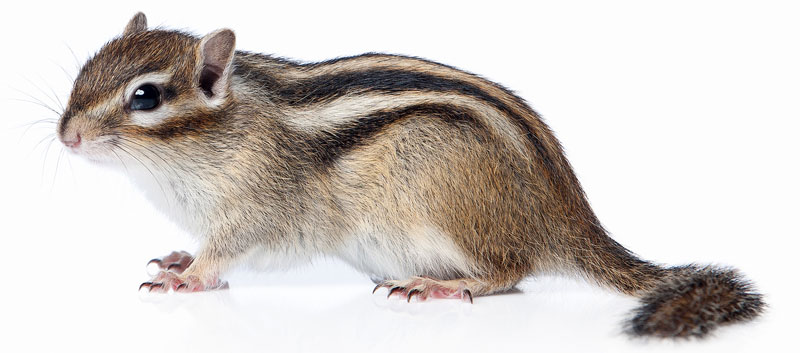
Chipmunks are small rodents with bodies averaging two to six inches long. Their bodies are similar in shape to their squirrel cousins, but they have shorter three-inch tails (allowing them to reach a total length of up to a foot) and brown, yellow, or grey fur shades.
They can also be distinguished by the alternating light and dark stripes which run from their cheeks down their backs.
What do Chipmunks Eat?
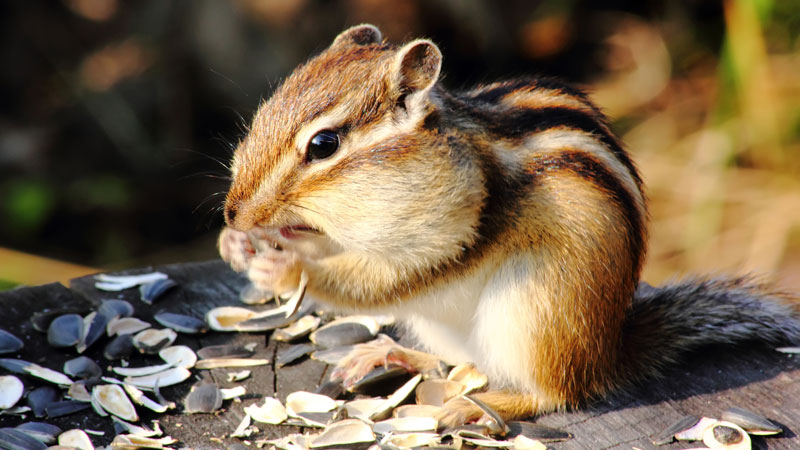
These critters prefer fruits, grass, nuts, and seeds. They may also munch on other plants, such as those in your garden. Thus, while nuts are their favorite food, they have no problem turning your yard into a salad during warmer months so they can build a food store.
If not for their appetite for roots, their occasional habit of snacking on insects such as crunchy June bugs could prove useful, but they're just as likely to eat your corn as the bugs targeting it. In addition, some chipmunks may also dine on worms, slugs, grasshoppers, spiders, bird eggs, and even small frogs.
Where do Chipmunks Live?
A woodland creature by preference, chipmunks can be found throughout North America. They stick to forested areas when possible, but can make their home in any location which provides plenty of cover. This can include urban areas such as gardens and parks.
Eastern Chipmunks prefer the eastern half of the continent, while Western chipmunks prefer the western half.
The sole exception to this rule is the Siberian chipmunk, which is native to Northern Asian countries, from central Russia to Japan. They still prefer more wooded locations, but have decided a good parka more than makes up for the cold Siberian winters.
Chipmunks vs Squirrels
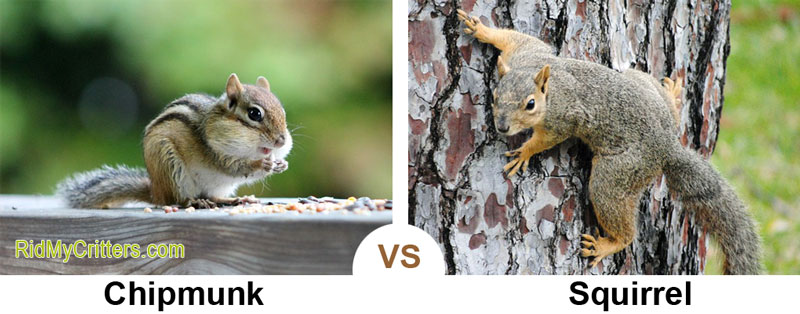
While closely related (both hailing from the Sciuridae family), the similarities don't go much further than that. Chipmunks are smaller and have shorter, less bushy tails than squirrels and patterning that help them hide in underbrush.
Also, while chipmunks are known to set up home in tree stumps, they much prefer building complex burrows underground.
How to Get Rid of Chipmunks
While rather cute, a wild chipmunk is almost always going to spell trouble. There are a few heartwarming stories of wild chipmunks adopting humans, but for the most part, they love your garden more than you.
Getting rid of chipmunks quickly is an important step in protecting your home from a number of potential problems.
In the Garden
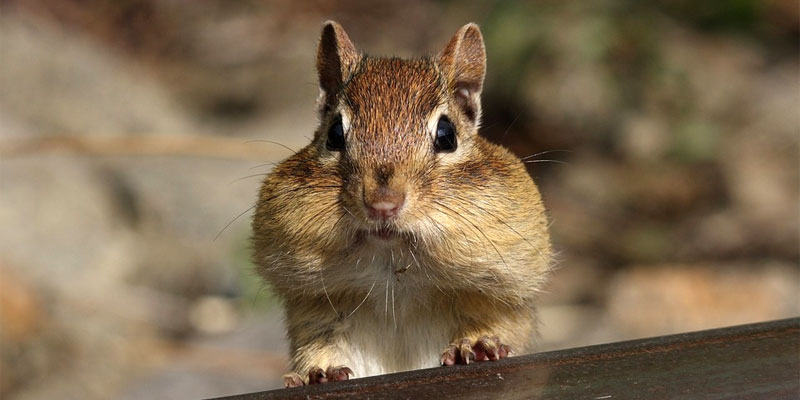
The garden is one of the most vulnerable parts of your home, not only to chipmunks, but to a wide variety of other critters. Rat traps are an effective means for capturing these critters, as they are similar in size but squirrel traps can also work. You can then release the critter back into the wild (several miles from home).
Another great way to get them out of the garden is with an owl box such as this one. Similar to a bird house in function, owl boxes attract these predators to your yard where they'll protect it from a wide range of pests.
This is one of the most natural means of removal for those not trying to attract small birds into the yard.
In the House
As with many critters, chipmunks can do a massive amount of damage if they get in the walls. Thankfully, chipmunks are very different from other rodents and likely entered your house by accident.
On the rare occasion they do get inside, you can be sure they'll want back out again. This can make removing them potentially both simple and frustrating.
In the extremely rare event a chipmunk finds its way into your attic, you will need to use traps to remove them. Having one in the rest of the house is a more simple matter. Just open up any windows and doors.
Want to Let the Pros Handle It?
Get a free quote from top pest control companies in your area.
Be gentle trying to usher the critter out so it doesn't injure itself. You may also prefer to close off the room it's in for a few hours until it leaves.
Remember, chipmunks have no interest in making a home in your home. Unless they're a pet, their only goal will be to get back outside. Once they're out, you'll need to determine how they got there in the first place, sealing any holes or other entry points to prevent further accidental invasions.
In the Yard
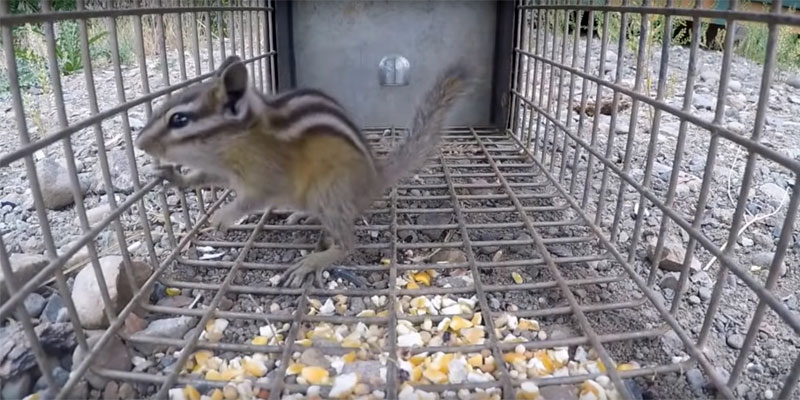
The key to getting a chipmunk infestation out your yard comes down to simply keeping it clean. Remove debris, stones, or other objects which provide potential shelter.
You will also want to ensure bird feeders are a good 15 feet or more from the house or garden areas. Clean up any fallen seeds, nuts, or berries so the chipmunk won't be able to dine and dash.
You may also wish to use live rat traps to capture them as they leave their holes. Then, fill the chipmunk holes to further discourage them from returning through the same tunnels. Just remember that chipmunks can dig new entrances, so try to get rid of as many as you can first.
Safe Removal Using Traps
Trapping a chipmunk is an easy matter, unlike many other species. A small cage rated for rats or squirrels (generally 5 inches by 5 inches by 14 inches in size) is perfect. This Kensizer trap or Faicuk trap are both good options.
Place some bait in the trap and set it in a shaded location. You may wish to wait a few days before actually setting the trap so chipmunks will start thinking of it as a food source. Try to avoid traps that kill chipmunks, as many places have strict ordinances on killing animals and the corpse may attract other pests.
PRO TIP: Do Squirrels Like Peanut Butter?
TThis is the caviar of the rodent world, especially for members of the squirrel family. A bit of peanut butter makes the perfect rodent bait, although you can also use seeds, whole peanuts, or even popcorn.
Once you actually set the trap, be sure to check it often, as a frightened chipmunk can easily hurt itself. Take the critter at least five miles away to an area with trees so they won't find their way back.
How to Keep Chipmunks Out of the Garden
There are several things you can do to keep chipmunks out of the garden once you've removed them. Fencing and natural plant deterrents can both be very effective against chipmunks and other unwanted critters.
Bird netting is a good example of a fence material that can deter chipmunks, as most will not wish to chew through the mesh material to reach a few plants. Be sure to extend the fence below ground by one to two feet to discourage pests from simply digging under it and has an enclosed top to prevent them from simply climbing it.
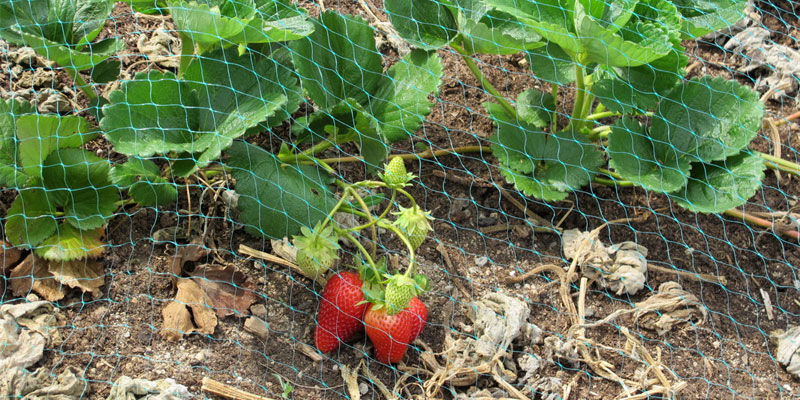
Alternatively, a few baited traps around the fence perimeter will prove more appealing than a long climb or trying to chew through the metal.
Garlic or hot peppers are crops that a chipmunk will turn its nose up at, so try using a garlic spray as a natural pest repellent. To make the spray, simply crush some garlic and hot peppers, then add then to a cup of hot soapy water in a spray bottle. The soap helps your spray to stick on plants longer, but it must still be applied every few weeks or after it rains.
One of the most natural methods of repelling pests is to use complimentary gardening. This is a process of using only plants that compliment each other's needs (such as varying root depth) or act as natural repellents.
Growing garlic, hot peppers, marigolds, or peppermint are all great ways to naturally produce scents that repel chipmunks while proving beneficial to your garden (and belly).
Using a Chipmunk Deterrent or Repellent
Deterrents are used to discourage critters from entering an area by creating an obstacle, while repellents make the area unattractive to them. Usually, a combination is the most effective means of keeping pests off your property. Here are some of the most popular choices from both categories.
Ultrasonic Repellent
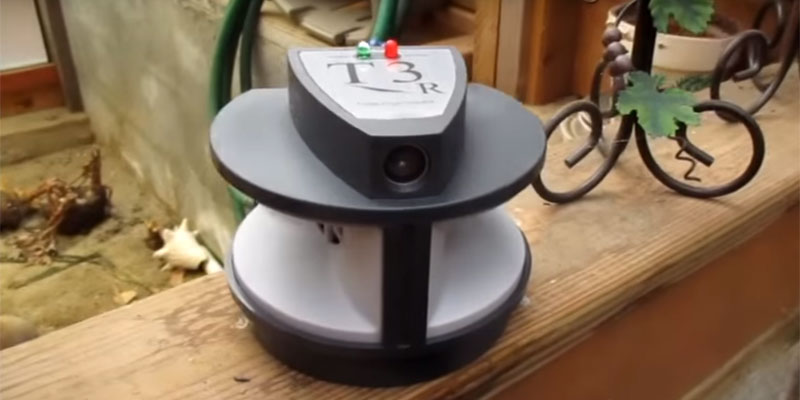
This type of defense works very well against most critters, causing a noise too high for human ears when a critter gets too close. The two downsides are that these can affect four-legged family members and invading critters are known to eventually get used to the sound.
We recommend the T3-R outdoor repeller. It works well at keeping chipmunks, squirrels, and other rodents away. It's safe to use around cats and dogs but some dogs with very sensitive hearing may hear it and stay away until they get used to it. Most users say it has absolutely zero effect on their pets.
Predator Urine
Another popular deterrent, crystallized predator urine can be sprinkled around the perimeter of your yard to frighten away a number of critters. In some cases, your used litter or rags soaked in ammonia can also do the job.
Want to Let the Pros Handle It?
Get a free quote from top pest control companies in your area.
If the smell of predator urine is simply too much, Rodent Defense spray will also work in most cases though you will need to reapply more often.
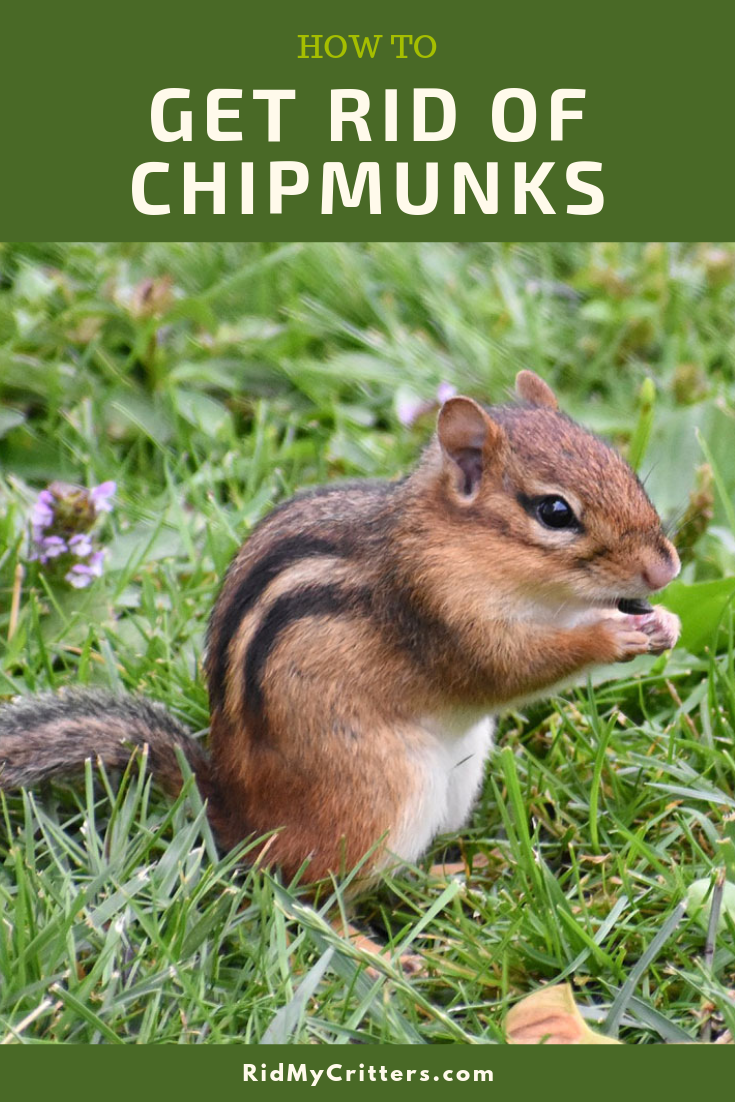
How To Get Rid Of Chipmunks In The Garden
Source: https://www.ridmycritters.com/how-to-get-rid-of-chipmunks/
Posted by: haassobsell.blogspot.com

0 Response to "How To Get Rid Of Chipmunks In The Garden"
Post a Comment